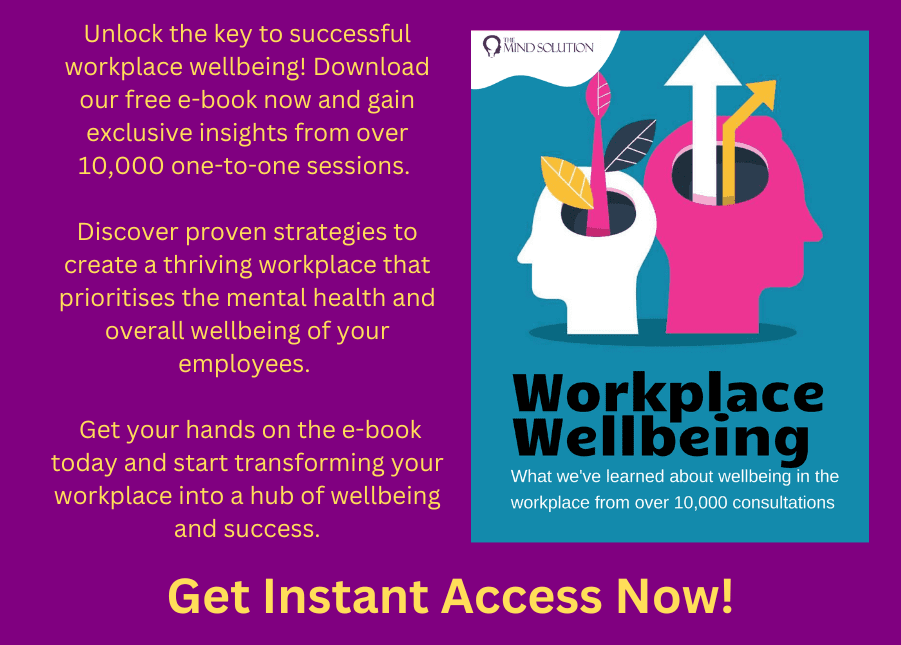With the growing awareness of mental health in the workplace and the investment in employee wellbeing in the workplace, mental ill health is still a very misunderstood subject.
The term anxiety, stress, and depression are now common language yet HR professionals and business leaders still struggle to understand what these labels mean for their employees and importantly what the right solution is in addressing them.
These labels also create fear in managers as they worry about addressing mental health problems within their teams incase they make things worse or get things wrong and worry they may exacerbate a situation for an employee.
While the term mental ill health is fast becoming part of our everyday language, when it comes to employee wellbeing in the workplace, mental ill health is not the real problem.
Mental Health is Not The Problem
To help you understand why mental health is not the real problem, but instead a bi-product of something else, let’s take this scenario of Mary.
Mary works in Publishing and has been in her job for 5 years. Over the last 6 months, her workload has slowly been increasing as a result of cuts being made to the company’s headcount. Mary has been feeling the pressure of her increased workload along with an underlying fear of losing her job.
Mary is single, lives alone and doesn’t have anyone to support her financially.
Fear about losing her job has been playing on her mind to the extent that the fear is compromising Marys’ sleep. She is finding it increasingly difficult to switch off when she gets home and her mind is caught in a cycle of rumination. To help her relax, Mary has started to turn more frequently to drinking a few glasses of wine each night because she feels it ‘takes the edge off’.
While the wine seems to help Mary relax in the evening, the quality of Marys sleep is affected and she is experiencing broken sleep as her liver is under more pressure.
Mary is now waking feeling tired due to a lack of deep sleep and is now drinking more coffee than usual to ‘keep her going’. Her dip in energy levels also means she has started to become less disciplined in going to the gym and with her food choices. Mary’s fatigue and stress levels have meant she doesn’t feel up to cooking and has been eating more packaged and convenient meals.
At work she finds her ability to focus becoming a struggle and her motivation and productivity levels have dropped.
As the weeks turn into months of living her life in this cycle, Mary started to develop stomach developing cramps and feeling bloated. Mary has been to her Doctor who advises her she has IBS (Irritable Bowel Syndrome) and gives her medication to take.
Mary attempts to make changes to her diet, cut back on the wine and get herself back on track however a combination of mounting pressure at work and her low energy levels, she finds herself going for what is quick and easy and hopes the medication will help the IBS. A combination of the IBS and her energy levels has also meant she has stopped going to the gym altogether.
After experiencing feeling this way for a further 6 weeks Mary is now feeling highly overwhelmed and finding herself becoming tearful over small things. Normally a chirpy and confident person, Mary feels disconnected and is becoming more insular and unable to cope.
Mary goes back to her Doctor who suggests that she may be depressed and prescribes a course of anti-depressants.
Mary starts taking the anti-depressants along with her IBS medications. After a month Mary sees no difference in her state of mind or how she is feeling, and her health continues to deteriorate. Mary is now signed off work with work-related stress.
Sadly, this is a very common situation and yet also a powerful example of how mental health wasn’t the real issue. Instead, Mary’s ability to cope combined with the changes being made in the workplace set into motion a series of factors which impacted her health.
How to treat mental health in the workplace
As the saying goes, knowledge is power. Had Mary had the knowledge to identify the stress response and had access to tools and resources like those found on our employee wellbeing portal, this situation may have been prevented.
Creating a culture of psychological safety where she felt safe to speak out about what she was experiencing could have also stopped the situation from spiralling further. In addition, her Manager was aware of the signs of stress and had attended Management Mental Health Training they may have been able to direct Mary to internal resources which would have supported her and provided earlier intervention.
Having worked with hundreds of employees 1 – 1 we hear stories like this all the time. By taking the prevention over cure approach, there is a lot that can be achieved by taking action to educate employees about wellbeing and how to recognise when they are not OK.
Get the conversation started with one of our employee wellbeing webinars!

Sara Maude, a seasoned Solution Focused Psychotherapist, Transformational Coach, Hypnotherapist, and EFT Practitioner, brings over a decade of mental health expertise to global organisations. She specialises in workplace wellbeing training, employee health and wellbeing programs and mental health training for managers. Sara’s proficiency also extends to wellbeing consultancy and wellbeing strategy, contributing significantly to the enhancement of employee wellbeing in the workplace.
